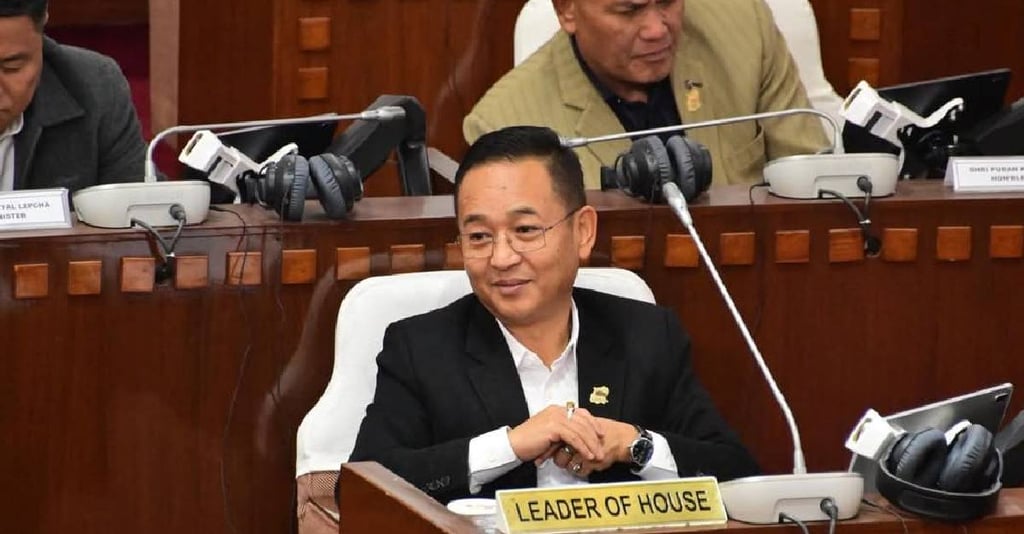Sikkim Legislative Assembly passes budget grants for multiple sectors
The session also saw the presentation, voting, and passing of Separate Demands for Grants for the financial year 2025-26, covering various government departments.
LOCAL


The third day of the Second Session (Part III) of the Eleventh Assembly (Budget Session 2025-2026) of the Sikkim Legislative Assembly took place today at the Assembly Secretariat in Gangtok. The session saw key discussions and decisions related to legislative and financial matters that are expected to impact the state’s development in the coming year.
During the legislative business, three important bills were passed, which had been introduced by the Minister-in-Charge of the Education Department on the second day of the session. These included the Atal Bihari Vajpayee Skill University Sikkim Bill, 2025, the Sengol International University Bill, 2025, and the Fusion University Sikkim Bill, 2025. The passage of these bills is expected to improve educational opportunities in the state, particularly in skill development and higher education. Following this, a Motion of Thanks on the Governor’s address, which was placed before the House on the second day of the session, was scheduled for discussion. However, since no discussion took place, the motion was put to vote and subsequently passed by the House.
The financial business of the day revolved around discussions on the General Budget for the financial year 2025-26. Several members participated in the debate, expressing their views on the proposals made in the budget. Minister Arun Kumar Upreti welcomed the budget and praised the Chief Minister for presenting a financial plan that keeps the interests of the people of Sikkim at its core. He stated that the budget prioritizes crucial sectors such as healthcare, education, infrastructure, and public services. According to him, the allocation of resources has been done in a way that ensures the overall development of the state while addressing the needs of all sections of society.
MLA LN Sharma also expressed his support for the budget and said that it reflects the government’s structured approach towards governance. He noted that the budget incorporates both ongoing and newly proposed developmental projects, which will contribute to strengthening infrastructure, improving public services, and fostering economic growth in Sikkim. Meanwhile, MLA Aditya Golay focused on initiatives aimed at benefiting the youth. He acknowledged the government's efforts in providing better educational resources, highlighting that under the Chief Minister’s leadership, 4,010 tablets had already been distributed across 443 schools in the state. He also requested the government to consider distributing laptops to college and school students, stating that such an initiative would further support their academic and professional growth.
In response to the discussion, Chief Minister Prem Singh Tamang addressed the House, emphasizing that the budget has been prepared with a strategic focus on key sectors such as tourism, roads, water, electricity, education, forests, and social security. He reaffirmed the government's commitment to achieving full literacy in Sikkim and stated that this year holds special significance as the state celebrates 50 years of statehood. He also highlighted various developmental projects undertaken by the state government and mentioned flagship schemes such as Aama Yojana, Bahini Yojana, and the Chief Minister’s Discretionary Grants, which are aimed at providing financial assistance and social welfare benefits to different sections of the population. Moreover, he reiterated that improving employment opportunities for youth and establishing Sikkim as a healthcare and wellness hub remain top priorities for the government.
The session also saw the presentation, voting, and passing of Separate Demands for Grants for the financial year 2025-26, covering various government departments. The approved grants ensure that departments such as Tourism and Civil Aviation, Commerce and Industries, Public Health Engineering, Water Resources, Ecclesiastical Affairs, Rural Development, Cooperation, Social Welfare, Women and Child Development, Senior Citizen and Divyangian Welfare, Printing and Stationery, Buildings and Housing, Labour, Urban Development, and Food and Civil Supplies receive the necessary funds to carry out their planned initiatives.
With these crucial discussions and approvals, the session concluded and the House was adjourned until 11:00 AM on March 28, 2025.
